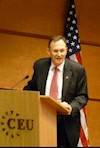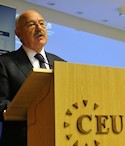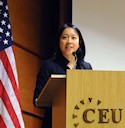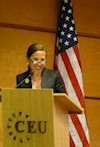 5/11/2012 - Budapest’s Central European University hosted a one-day conference to mark the 90th anniversary of diplomatic relations between Hungary and the United States on May 9th. The conference, co-organized by the Ministry of Foreign Affairs and the US Embassy in Budapest, was opened by Hungarian Foreign Minister Janos Martonyi and US Deputy Assistant Secretary of State for European Affairs Bay Fang. 5/11/2012 - Budapest’s Central European University hosted a one-day conference to mark the 90th anniversary of diplomatic relations between Hungary and the United States on May 9th. The conference, co-organized by the Ministry of Foreign Affairs and the US Embassy in Budapest, was opened by Hungarian Foreign Minister Janos Martonyi and US Deputy Assistant Secretary of State for European Affairs Bay Fang.
 Lecturers at the conference included US political scientist Prof. Andrew Ludanyi, member of the AHF International Affairs Committee, as well as Katrina Lantos Swett, president and CEO of the Tom Lantos Institute, Peter Sztaray, a senior official at the Hungarian Foreign Ministry, and Ambassador Geza Jeszenszky. The conference was concluded with speeches by Hungarian Ambassador to the US Gyorgy Szapary and US Ambassador to Hungary Eleni Tsakopoulos Kounalakis. Lecturers at the conference included US political scientist Prof. Andrew Ludanyi, member of the AHF International Affairs Committee, as well as Katrina Lantos Swett, president and CEO of the Tom Lantos Institute, Peter Sztaray, a senior official at the Hungarian Foreign Ministry, and Ambassador Geza Jeszenszky. The conference was concluded with speeches by Hungarian Ambassador to the US Gyorgy Szapary and US Ambassador to Hungary Eleni Tsakopoulos Kounalakis.
The panels discussed a variety of topics:
-
 Panel I: The Initial Years, in which Professor Andrew Ludányi presented “Émigré Reactions to Early Bilateral Diplomatic Relations” Panel I: The Initial Years, in which Professor Andrew Ludányi presented “Émigré Reactions to Early Bilateral Diplomatic Relations”
- Panel II: The Second World War
- Panel III: The Cold War in which Amb. Géza Jeszenszky discussed “Transformation of U.S.-Hungarian Relations”
- Panel IV: After the Changes
- [See the full program]
 |
| [read] Minister János Martonyi's Remarks on Ninety Years of U.S.-Hungarian Diplomatic Relations at Central European University, May 10, 2012. |
Hungary and the United States are connected by numerous shared values such as democracy, freedom and respect for human rights,but they do not necessarily choose the same way to cope with challenges, Hungarian Foreign Minister Janos Martonyi told the conference on Thursday. “Nevertheless, they belong to the same family of democracy and strive to make the world a better place to live in,” the minister told the conference organised by the Foreign Ministry, the US Embassy and the Central European University to mark the 90th anniversary of diplomatic relations between the two nations. Martonyi cited cooperation in Afghanistan and Libya as examples. He said Hungarian-US relations were stable and were significant for millions of people. “These relations are much older than 90 years, and there have been many Hungarian successes in the United States in politics, science and art and Hungary is proud of these achievements,” he said.
 |
| [download] Remarks by Deputy Assistant Secretary of State Bay Fang at the conference “Ninety Years of U.S.-Hungarian Diplomatic Relations” |
Bay Fang, Deputy Assistant Secretary of State from the Bureau of European and Eurasian Affairs, said the two countries could be proud of what they had achieved as one another’s allies and partners. Hungary and the United States can bravely face the challenges of the 21st century as they are connected by strong bonds of partnership, Fang said, adding that the next 90 years of relations should also be characterised by a similar friendship.
She added that high-level visits between the two countries are frequent, such as the Transatlantic week organised last year, when the late former president Ronald Reagan and the late Hungarian-born politician Tom Lantos were remembered in the presence of current and former Secretaries of State Hillary Clinton and Condoleezza Rice.
Fang pointed to the importance of democratic institutions and person-to-person relations, underlining that these could boost diplomatic goals and would operate even when official ties break down. Hungary and the United States are linked by their commitment to shared values such as respect for democracy, freedom and human rights and the knowledge that they are able to discuss any differences they might have as friends is important, the ambassadors representing the two countries agreed in their addresses at the conference.
Hungary’s Ambassador to the US Gyorgy Szapary said the concerns of the US regarding Hungary were for stability, which must be respected. He said his task as ambassador to Washington, DC, is to explain there that changes Hungary has been implementing serve stability and the strengthening of democracy.
 |
| [download] remarks by US Ambassador to Hungary Eleni Tsakopoulos Kounalakis. |
US Ambassador Eleni Tsakopoulos Kounalakis emphasised that the two countries have a “very vibrant relationship” which is primarily about people. She said many Hungarians had come to the US “with modest means and found a new home, one that offered opportunities, fulfillment, and a chance to contribute to society in a meaningful way...
“Our job now – as partners and allies – is to serve as an example for other emerging democracies, and as an inspiration for those who yearn for their countries to begin such a transition,” the Ambassador said.
While the two countries established official diplomatic ties when an American Legion was opened in Budapest on December 17 in 1921 and Count Laszlo Szechenyi presented his credentials in Washington, D.C. in 1922, unofficial contacts have been present ever since the War of Independence. Colonel Commandant Michael Kováts, a Hungarian nobleman is regarded as the founder of the American Cavalry, and was one of the first heroes to lay down his life for American independence near Charleston, South Carolina. Friendly relations between the two nations were further enhanced through Lajos Kossuth’s visit to the United States in 1851 – whose bust is one of the few foreign nationals present in the Capitol Rotunda. Kossuth was the second foreign national – after the Marquis de LaFayette – ever to be given the honor of speaking before a joint session of Congress.- based on the MTI report and edited by Bryan Dawson. Photos courtesy State Department and Embassy photo by Attila Németh.
[<< Back to All AHF News]
| Related Links
- Key Dates in Hungarian-American Diplomatic Relations: Diplomatic relations between Hungary and the United States were formally established in 1922, although unofficial contacts have been present ever since the War of Independence. Colonel Commandant Michael Kováts, a Hungarian nobleman is regarded as the founder of the American Cavalry, and was one of the first heroes to lay down his life for American independence near Charleston, South Carolina. Friendly relations between the two nations were further enhanced through Lajos Kossuth’s visit to the United States in 1851 – whose bust is one of the few foreign nationals present in the Capitol Rotunda. Kossuth was the second foreign national – after the Marquis de LaFayette – ever to be given the honor of speaking before a joint session of Congress.
- April 29, 2003 - US Senate Testimony: "NATO Enlargement: Promoting Western Values, Strengthening the Alliance." Calling attention to minority protections. before the United States Senate Committee on Foreign Relations.
- March 25, 2009 - US Senate Reception on the Occasion of the Policy Reception in Honor of NATO and Its Enlargement - : Remarks of Frank Koszorus, Jr.
- April 2009 - CEEC statement on NATO Enlargement and Supporting the Open Door Policy.
- July 2007 - Hungary's Accession to NATO: An expanded report by Frank Koszorus, Jr.
- October - November 1997: The Debate on NATO Enlargement:
Hearings Before the U.S. Senate Committee on Foreign Relations. Testimony of Frank Koszorus, Jr., President, AHFDC. An interesting exchange with Sen. John Kerry.
- June 20, 1996 - U.S. Policy Toward NATO Enlargement: Hearing before the Committee on International Relations,
United States House of Representatives 104th Congress, Second Session: Testimony of Frank Koszorus, Jr., President, AHFDC.
- June 2007 - Hudson Institute Panel: Enduring Strains of Communism
in Central and Eastern Europe
- March 29, 2004 - On the Occasion of NATO Expansion, Corcoran Gallery of Art. AHF Remarks by Frank Koszorus, Jr.: NATO
Enlargement and Minority Rights
- October 24, 2003 - AHF Memorandum on Romanian President Iliescu Visit
Join online!

|



